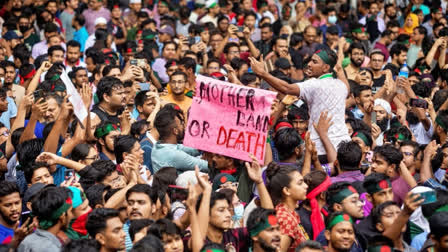New Delhi: The series of rapid political developments in Bangladesh this week that led to the ouster of Prime Minister Sheikh Hasina has raised the question of whether India should revisit its Neighbourhood First Policy. "You can change your friends but not your neighbours," former Prime Minister Atal Bihari Vajpayee had once famously said.
Though India has historically placed a significant emphasis on its relations with neighbouring countries, the formal articulation of the Neighbourhood First Policy became prominent after Prime Minister Narendra Modi took office in May 2014. This policy marked a renewed focus on building stronger ties with South Asian nations and was seen as a strategic move to ensure regional stability and mutual development.
The basic objectives of this policy are: ensuring peace and stability in the region by resolving conflicts and preventing the escalation of disputes; promoting economic cooperation and integration with neighbouring countries to foster mutual growth and development; enhancing connectivity through infrastructure projects such as roads, railways, and ports to facilitate trade and people-to-people contact; strengthening cultural and people-to-people ties through educational exchanges, tourism, and cultural diplomacy; and engaging in regional forums and organisations like South Asian Association for Regional Cooperation (SAARC) and Bay of Bengal Initiative for Multi-Sectoral Technical and Economic Cooperation (BIMSTEC) to address common regional challenges.
That India would give a renewed thrust to its ties with immediate neighbours became evident when Modi invited leaders of the SAARC countries for his first swearing-in ceremony in May 2014. It was a symbolic gesture underlining the importance of the Neighbourhood First Policy.
Key initiatives under this Policy include economic and developmental assistance, connectivity projects, trade agreements, security cooperation and humanitarian assistance during times of natural disasters. The idea behind all these is that political and socio-economic development of India is largely dependent on a stable, secure and peaceful neighbourhood.
However, despite New Delhi pursuing this Policy as a key part of its foreign policy initiatives, regime instability continues to plague India’s immediate neighbours, the latest instance being the case of Bangladesh.
In Nepal, there have been frequent changes of government since the end of monarchy in 2008 with no government able to last a full term. In Myanmar, a civil war rages on after a military coup in 2021 that saw the ouster of the democratically-elected government of Nobel laureate Aung San Suu Kyi. Sri Lanka was hit by a huge economic crisis in 2022 that saw then President Gotabaya Rajapaksa fleeing from the country. The Maldives has been swinging between pro-India and anti-India governments.
Bangladesh has now come as a tipping point. A neighbour with whom New Delhi enjoyed the closest of ties till the other day is now seeing the prospects of a potentially anti-India regime coming to power. Amidst all these, China is continuously pushing its agenda of increasing its influence among South Asian nations. It is in the light of all this that the question of whether New Delhi should revisit its Neighbourhood First Policy arises.
"The basic assumption of the Neighbourhood First Policy was that if India could share its prosperity with its smaller neighbours, then instability across the borders will not spill over into Indian territory," K Yhome, Fellow at the Shillong-based think tank Asian Confluence, told ETV Bharat. "By sharing its economic development with the smaller neighbouring countries, India wants to ensure a level of stability in the region."
Yhome explained that there is an external dimension to this as well. "By integrating economically with these countries, India could ensure that external powers inimical to its interests do not get a foothold in the region," he said. "Against this background, if we look at the political developments in Bangladesh, the question is whether India's Neighbourhood First Policy achieved the desired goals in the neighbourhood."
At the same time, Yhome said that there were domestic dynamics in Bangladesh that were beyond India's control. "Certain internal developments within these countries are not necessarily of India's making," he said."In many such cases, the dynamics are driven from within. However, in the case of Bangladesh, what brought India into the picture was Hasina's decision to take refuge in the country."
